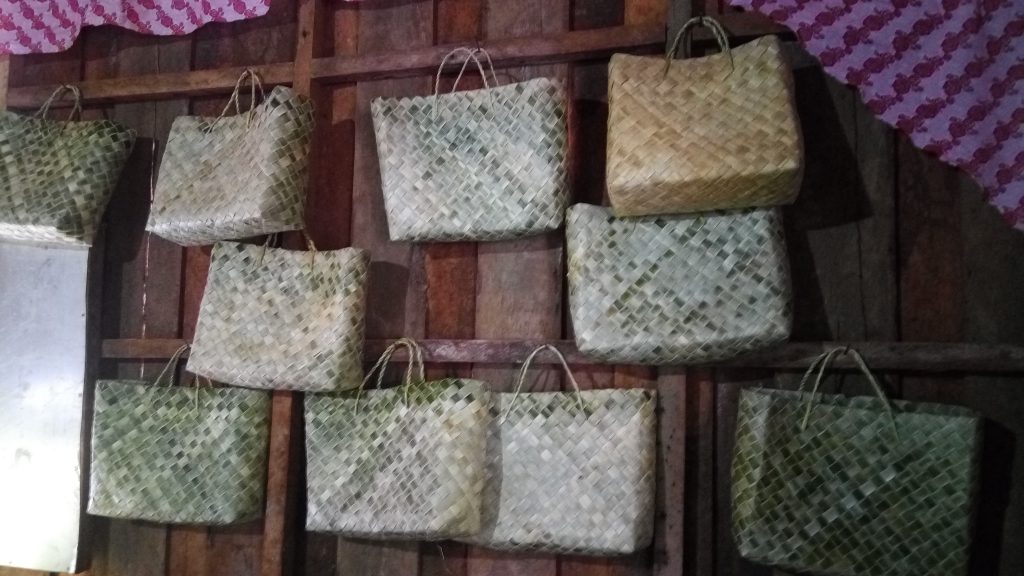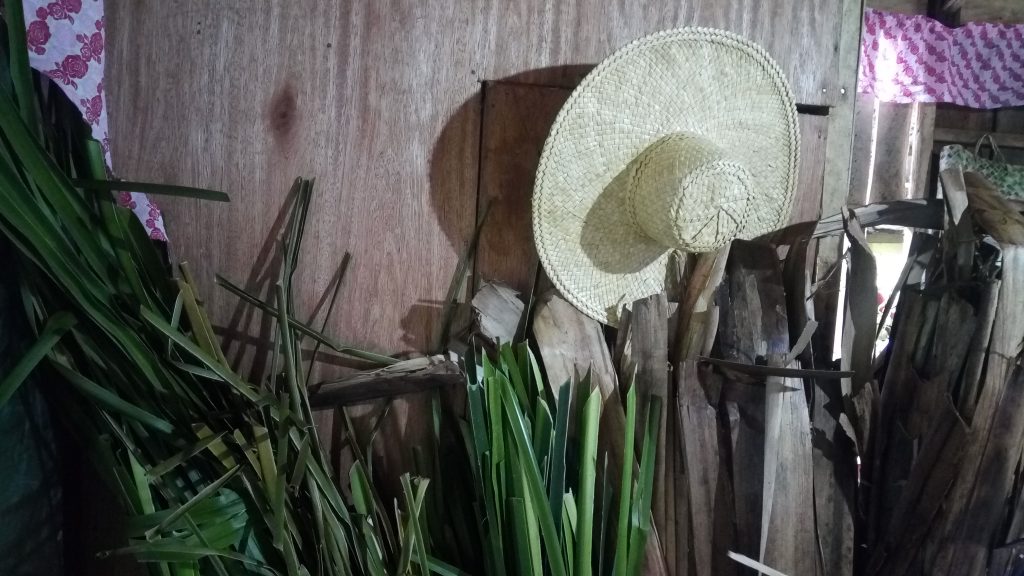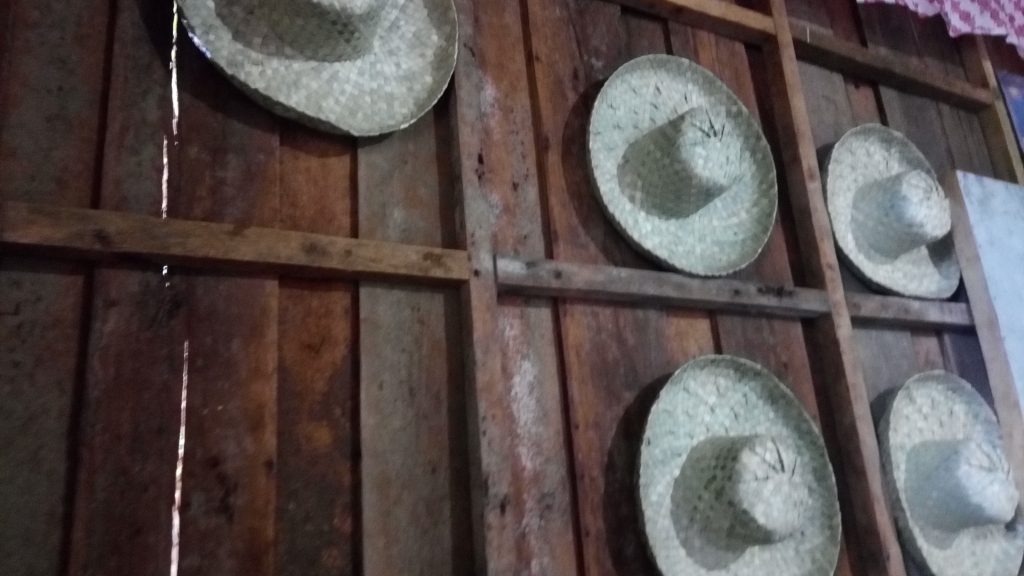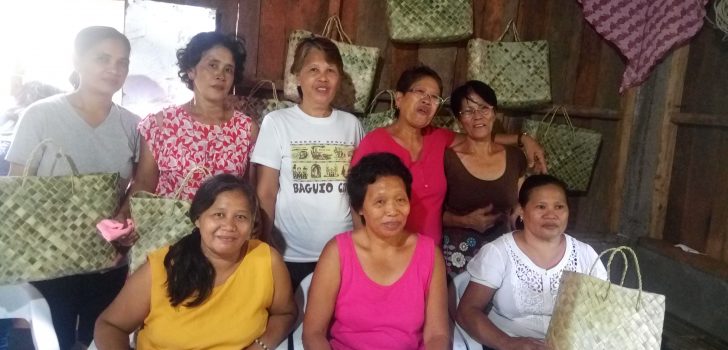 Rural women of the Olandia Rural Improvement Club show their hand-woven native bags made out of karagumoy, a palm grass used as craft material in Sorsogon. (Photo by Annielyn L. Baleza, DA-PRDP Bicol RPCO InfoACE Unit)
Rural women of the Olandia Rural Improvement Club show their hand-woven native bags made out of karagumoy, a palm grass used as craft material in Sorsogon. (Photo by Annielyn L. Baleza, DA-PRDP Bicol RPCO InfoACE Unit) PRDP’s handicrafts making subproject helps typhoon-affected rural women recover
BARCELONA, SORSOGON – Ten fingers plus hard work and patience. These, according to Olandia Rural Improvement Club (RIC) Chairperson Estrella Espinar, are basic “capital” in handicrafts making.
Maximizing these capital and the tireless determination of rural women of Brgy. Olandia, Barcelona to support their families, the RIC thought of establishing a cottage industry for handicrafts in Brgy. Olandia, Barcelona, in Sorsogon.
Holding a set of native baskets, 62-year old weaver Estrella Estigoy shared how she was able to raise her six children and send them to school through handicrafts making. She was a young mother at 22 when she decided to try handicrafts making as a source of additional income to augment their family income. Estigoy and her family earn P400 for each set of native baskets. In four weeks, they could earn about P8,000 to P10,000 as the products from the small cottage industry had reached local and foreign markets. In fact, Olandia RIC’s products were already featured in Orgullo Kan Bikol-Gayon Regional Trade and Travel Fair at SM Megamall and at the Kasanggayahan Trade Fair and Exhibit in Sorsogon City.
However, when typhoon Nona hit the province in December 2015, Estigoy was among the 47 RIC members in Brgy. Olandia who struggled in sustaining their livelihood due to the unavailability of raw materials. The typhoon devastated not only their houses, but even the forests where they get raw materials for the production of native bags, hats, baskets, and mats made of bariw, karagumoy, and balakbak from abaca.
Yet, as Bicolano women known for their resilient character, the Olandia RIC immediately sought the assistance of the Office of the Provincial Agriculture while waiting for their karagumoy, abaca, and bariw plantation’s recovery. They also engaged in various income-generating activities such as vegetable gardening, hog raising, and food vending. Fortunately, the Department of Labor and Employment (DOLE)-registered RIC was one of the 10 proponent groups that qualified for the Philippine Rural Development Project’s (PRDP’s) microenterprise subprojects for calamity-stricken areas in the province.
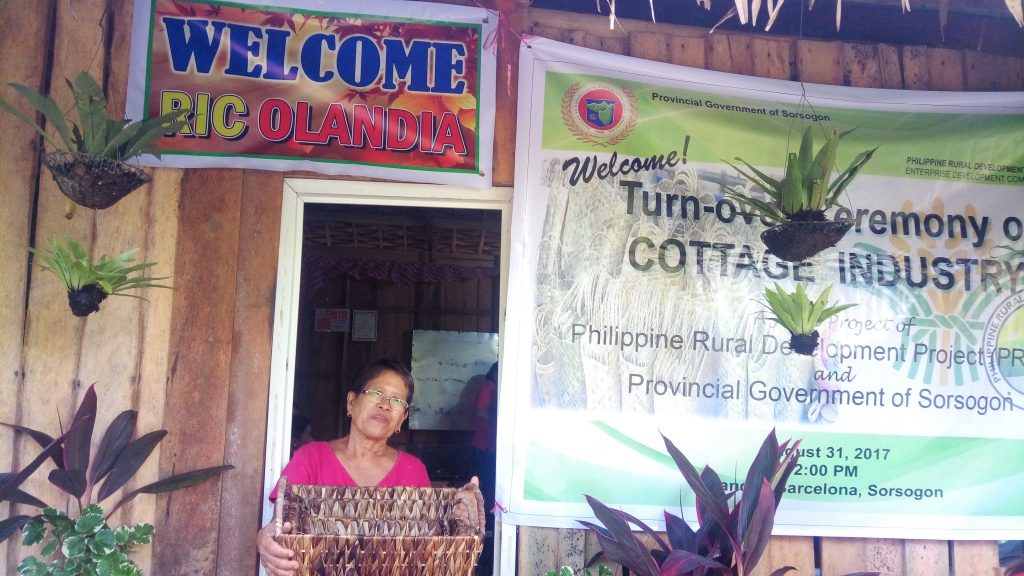
Olandia Rural Improvement Club weaver Estrella Estigoy shows a set of native baskets, one of the RIC’s finished products to be produced at the processing center. (Photo by Annielyn L. Baleza, DA-PRDP Bicol RPCO InfoACE Unit)
On August 31, PRDP turned over to RIC Olandia the 5 by 6 meters processing center made of local materials. The turn-over ceremony was attended by Gov. Robert Lee Rodrigueza, Barcelona Vice Mayor Maria Fortades, and provincial board members Benedict Hao, John Ryan Dioneda, Maria Teresa Fragata, and Marnellie Robles.
The said processing center was constructed to house the production equipment and materials. A production manager will be assigned at the processing center to oversee the process of stripping, drying, weaving, and sewing. Finished products will be turned over to the marketing manager. The latter will then be responsible in selling the products to prospective buyers and in submitting the revenues to the treasurer. The treasurer, on the other hand, will then pay the individual member-producer for their respective products sold while 5 percent hold-over fund from the revenue will be collected for the RIC’s capital build-up. With an average monthly income of P61,515.17, RIC Olandia projects a 153 percent return of investment for the first year of its operation.
Rodrigueza expressed his commitment to support the microenterprise through the Provincial Commodity Trading and Processing Center in Brgy. Abuyog, Sorsogon City where the RIC can display and directly sell their products. They were also encouraged by provincial board member Fragata to explore designs that would add more value to their products.
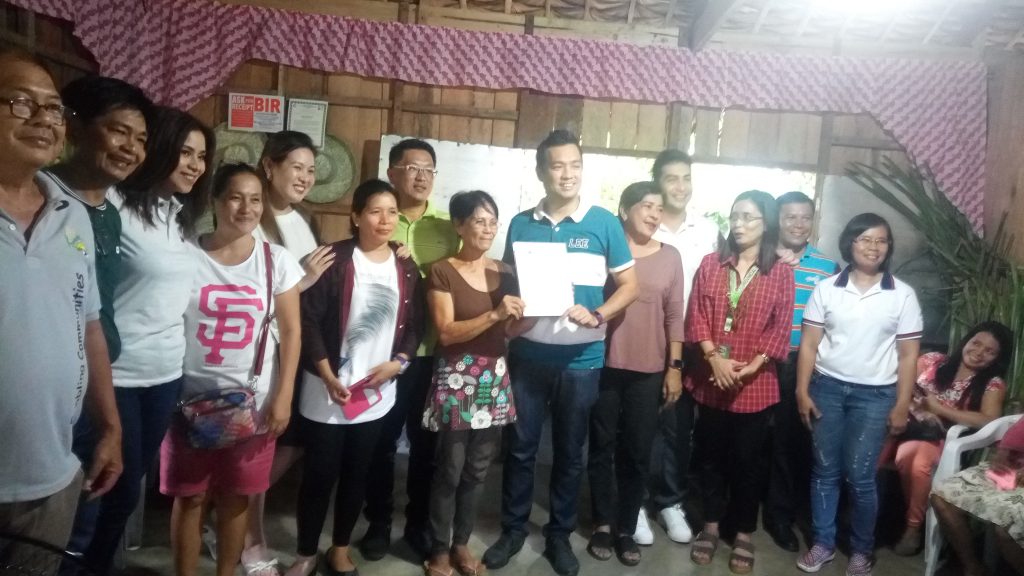
Olandia Rural Improvement Club (RIC) Chairperson Estrella Espinar (8th from left) receives a certificate from Governor Robert Lee Rodrigueza (9th from left) during the turnover of the Barangay Olandia RIC Cottage Industry Center. (Photo by Annielyn L. Baleza, DA-PRDP Bicol RPCO InfoACE Unit)
In support to the P479,742-worth Establishment of Cottage Industry (Handicraft) microenterprise subproject, the RIC will also receive two designer sewing machines, three sewing machines, and two freezing machines from the PRDP to boost their handicrafts production. The Project will also provide a tricycle which will serve as the group’s delivery and hauling vehicle.
“’Pag may handicraft, may trabaho, may kita. Malaking tulong, masaya (Through handicrafts making, we have work to do, we have income. It’s a big help, [we are] happy),” Espinar said. She added that through the PRDP, they have learned how to make a feasible project proposal and how to effectively manage their members.
The Establishment of Cottage Industry (Handicraft) is one of the 10 approved microenterprise subprojects for calamity-stricken areas in Sorsogon.
PRDP is a six-year World Bank-assisted national project being implemented by the Department of Agriculture to establish an inclusive, value chain-oriented, and climate-resilient agri-fishery sector in the countryside. ### (Annielyn L. Baleza, DA-PRDP Bicol RPCO InfoACE Unit)

